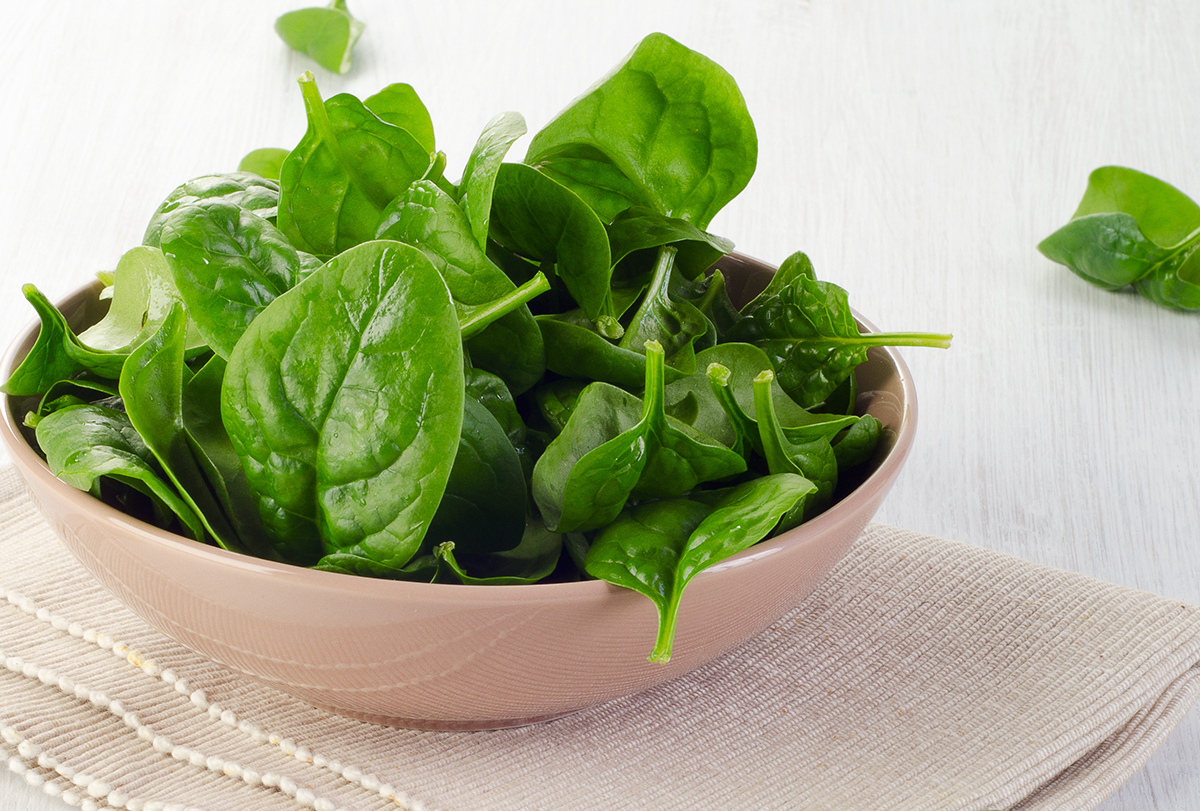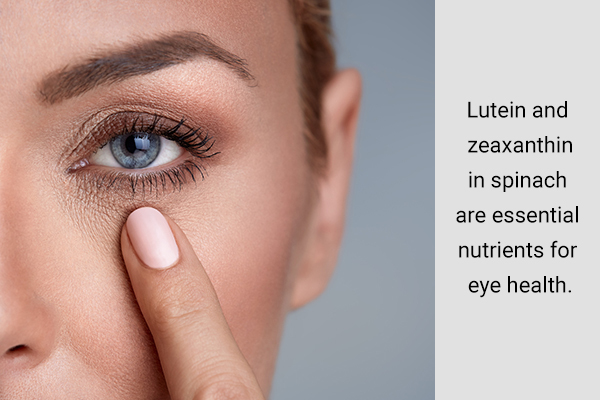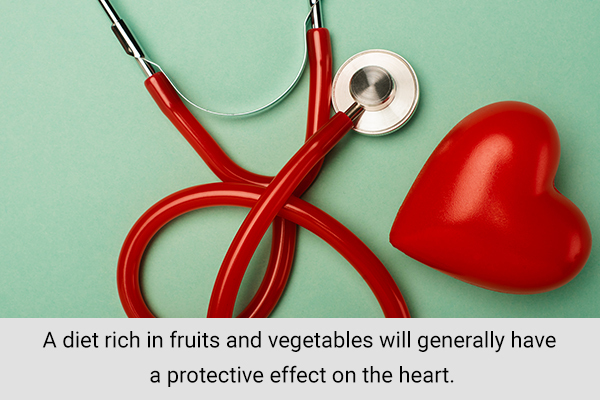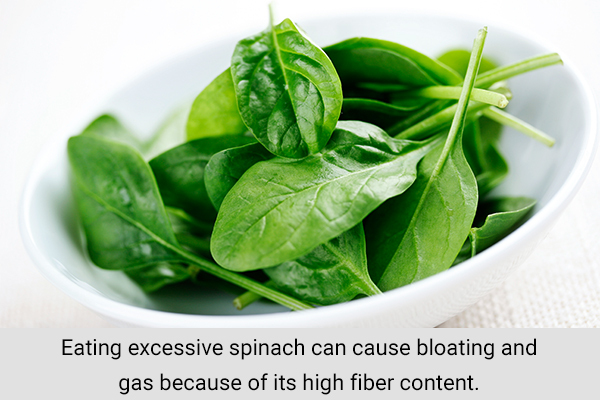In this article:
Among all the green leafy vegetables, spinach is the most commonly consumed. It was widely popularized by the cartoon character Popeye, who gained instant strength upon eating spinach.

And although eating spinach doesn’t give you instant energy like that, there are many health claims associated with eating spinach.
Green leafy vegetables are linked to many health-promoting benefits due to their bioactive compounds and are referred to as a functional food. (1)
Nutritional Composition of Spinach
Spinach is a water-rich food and shrinks considerably when cooked. One cup of raw spinach leaves, which comes up to 30 g, has only 7 calories. It contains 0.7 g of fiber (2% of the daily requirement), 27 g of water, 0.9 g of protein, and 0.1 g of fat. (2)
Spinach has a rich vitamin profile with 141 mcg of vitamin A (16% of the daily requirement), 58 mcg of vitamin B9 (15% of the daily requirement), 8.4 mg of vitamin C, 0.6 mg of vitamin E, and 145 mcg of vitamin K (121% of the daily requirement). It is also replete with beta-carotene, lutein, and zeaxanthin, which are the components of vitamin A. (2)
Moreover, spinach is abundant in minerals including manganese (0.3 mg), calcium (30 mg), magnesium (24 mg), potassium (167.4 mg), and iron (0.8 mg). (2)
Health Benefits of Spinach
Here are some of the benefits eating spinach can offer you.
1. Maintains eye health

Lutein and zeaxanthin in spinach are essential nutrients for eye health.
In a study done in Japan, eating 75 g of spinach, which gave 10 mg lutein, for 2 months, resulted in improved macular density of the eye. This effect is important to avoid degeneration of the eye because of age or disease. (3)
In another recent study, spinach extract also protected the eye from diabetic damage. (4)
2. Reduces the risk of osteoporosis
The rich vitamin K content of spinach along with some of the calcium can improve bone strength and density. Vitamin K specifically plays a role in creating new cells in the bones and improving strength.
Studies have reported vitamin K intake reduced the risk of fractures in women. (5)
3. Aids in the treatment of anemia

Spinach is considered a suitable food for improving iron deficiency anemia. However, spinach is not as rich in iron as other food sources, and its availability of iron is quite poor.
However, spinach can be included in a diet to improve anemic status. A study has found the addition of chicken and orange to a dish containing spinach improved the availability of iron from spinach.
Tea and eggs inhibit the availability of iron; thus, care must be taken not to drink tea immediately after eating an iron-rich meal. (6)
4. Contributes to weight management
Spinach is a low-calorie food that packs a ton of nutrients in a little amount. Because of this, spinach is a great food to include in a weight management diet.
A specific compound within spinach – thylakoid – has been studied for its role in the management of obesity and its consequences.
In a 12-week study, 48 women with obesity and polycystic ovarian syndrome (PCOS) had been observed to have significant weight loss, reduction of waist circumference and overall fat, and improved insulin sensitivity upon consumption of thylakoid-rich spinach. (7)
5. Protects the heart

A diet rich in fruits and vegetables will generally have a protective effect on the heart. It can provide nutrients and antioxidants necessary for health.
But among those vegetables, those with high nitrate content, such as spinach, have a protective effect on the blood vessel. (8)
In one study, consumption of spinach reduced systolic and diastolic blood pressure. (8)
6. Manages blood sugar levels
The antioxidant capacity of spinach has a positive effect on factors involved in type 2 diabetes.
Studies have identified 13 total antioxidants, 14 flavonoids, and 10 total phenolic compounds in spinach. (9) In animal studies, consumption of spinach for 45 days improved cholesterol levels that normally rise in diabetes. Total blood sugar and insulin levels were reduced and glucose tolerance also improved. (9)
Another study identified the use of spinach extracts to heal diabetic ulcers. (10)
7. Supports pregnancy

Spinach contains nutrients that are useful in supporting a healthy pregnancy. Research has shown a diet teeming with fiber can reduce the risk of developing diabetes during pregnancy (called gestational diabetes). (11)
In addition, vitamin A, one of the most abundant vitamins in spinach, is important in the development of the baby inside the womb. A deficiency of this vitamin can cause blindness. (12)
8. Can aid in hydration
Water is vital for health and many of the body’s physiological functions. Foods such as spinach are almost 90% water and can aid in hydrating the body. (13)
9. Boosts immunity

The vitamin C in spinach along with some of the nutrients in it is involved in boosting the body’s immune function. A recent study identified spinach as a useful vegetable in promoting immunity. (14)
10. Supports skin health
Spinach has the ability to prevent damage caused by free radicals. This can be helpful in maintaining skin health. (15)
The chlorophyll, zeaxanthin, and vitamins E and C in spinach can maximize the antioxidant potential of the body, remove cancer-causing substances, and prevent damage to cells. All these effects can work together to prevent skin aging. (16)
How to Consume
While spinach abounds in nutrients, it also contains phytates and oxalic acid. These can act as “antinutrients,” which can prevent the absorption of good nutrients. Therefore, before using spinach, it is important to blanch the leaves before eating.
Blanching is done by adding the cleaned leaves to almost boiling water with the heat turned off, letting it sit in the hot water for 3–12 minutes, and then draining the water. (17)
Spinach can be made into dips, soups, side meals, or even smoothies and health drinks. Spinach can also be pureed to be mixed into flour to make spinach breads or flatbreads.
Precautions to Consider

Before eating spinach, keep these things in mind:
- Eating excessive spinach can cause bloating and gas because of its high fiber content.
- The oxalic acid in spinach can lead to the formation of kidney stones in people who are prone to it.
- Children and infants should not be given an excessive amount of spinach.
- Eating large amounts of spinach may also cause the blood to clot. This property may inhibit the activity of certain drugs such as warfarin (blood thinners).
Most-Asked Questions About Spinach
How can I eat spinach to improve anemia?
The iron present in spinach is not readily available to the body. It is recommended to have spinach with some iron-absorption enhancers, such as lemon juice or nonvegetarian sources such as yogurt or meat.
Can I eat raw spinach?
Small young leaves can be eaten raw in salads or smoothies, but the mature leaves taste better when cooked.
Is red spinach better than green spinach?
Red spinach is higher in antioxidants but has higher oxalate content than green spinach, thus increasing the risk of kidney stone formation. (18)
Final Word
Spinach is one of the few green leafy vegetables that are easy to consume. It is packed with many nutrients that can be useful to health, such as maintenance of eye health, management of diabetes, improvement of insulin levels, and even supporting a healthy pregnancy.
Just remember to blanch the spinach before eating it to reduce its antinutrient and oxalate content.
- Was this article helpful?
- YES, THANKS!NOT REALLY


